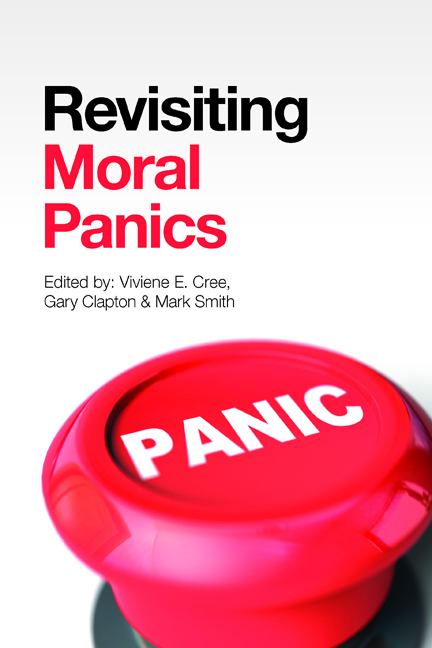Book contents
- Frontmatter
- Contents
- Contributors
- Preface
- Commentary moral panics yesterday, today and tomorrow
- Part One Gender and the family
- Part Two Moral panics in our time? Childhood and youth
- Part Three The state, government and citizens
- Part Four Moral crusades, moral regulation and morality
- Afterword the moral in moral panics
- Conclusion Moral panics and beyond
- Index
Afterword
Published online by Cambridge University Press: 08 March 2022
- Frontmatter
- Contents
- Contributors
- Preface
- Commentary moral panics yesterday, today and tomorrow
- Part One Gender and the family
- Part Two Moral panics in our time? Childhood and youth
- Part Three The state, government and citizens
- Part Four Moral crusades, moral regulation and morality
- Afterword the moral in moral panics
- Conclusion Moral panics and beyond
- Index
Summary
Endings are commonplace within life and work and yet can often be neglected among the demands of front-line social work practice. There can be pressure to close cases once acute risks have been addressed. A difficult meeting or phone call is still on your mind in the evening or over the weekend. Ideally, an ending supports the transition between one state and another and often this is best achieved when it is prepared for in advance. While reading Part Two, you may have been thinking of your own work and asking yourself what difference an understanding of moral panics might make to your research, study or practice. Within this afterword, I hope to help in this transition from theory to practice by identifying what I feel are some of the key themes addressed by the contributors and discussing their relevance to the current context of social work policy and practice.
I am employed as a social worker in a local authority Children and Families practice team in Scotland and have previous experience of youth work and residential childcare. My current role encompasses child protection, children in need, looked after and accommodated children, and adoption and permanency work. This places my perspective within a specific context. Scotland has its own legal system and distinctive Children's Hearing System (see Hothersall, 2014). However, many of the issues facing social workers in Scotland have much in common with other child welfare systems in Anglophone countries (Lonne et al, 2009). I would like to concentrate on two broad themes, both of which are indicated in the quote from Stanley Cohen (1972) at the beginning of Chapter Six by Ian Butler, and which in my opinion are particularly relevant for social work policy and practice: firstly, the way in which social problems are represented in moral panics; and secondly, the responses to those social problems.
Each of the contributions in this part describes how a phenomenon, individual or group becomes defined as a social problem and represented through the media, politicians and other ‘claims makers’, or ‘moral entrepreneurs’, in ways that are over-simplified, stereotyped and distorted. Specific strategies are used by claims makers to foreground their opinions and construct problems according to particular ideologies.
- Type
- Chapter
- Information
- Revisiting Moral Panics , pp. 123 - 130Publisher: Bristol University PressPrint publication year: 2015



